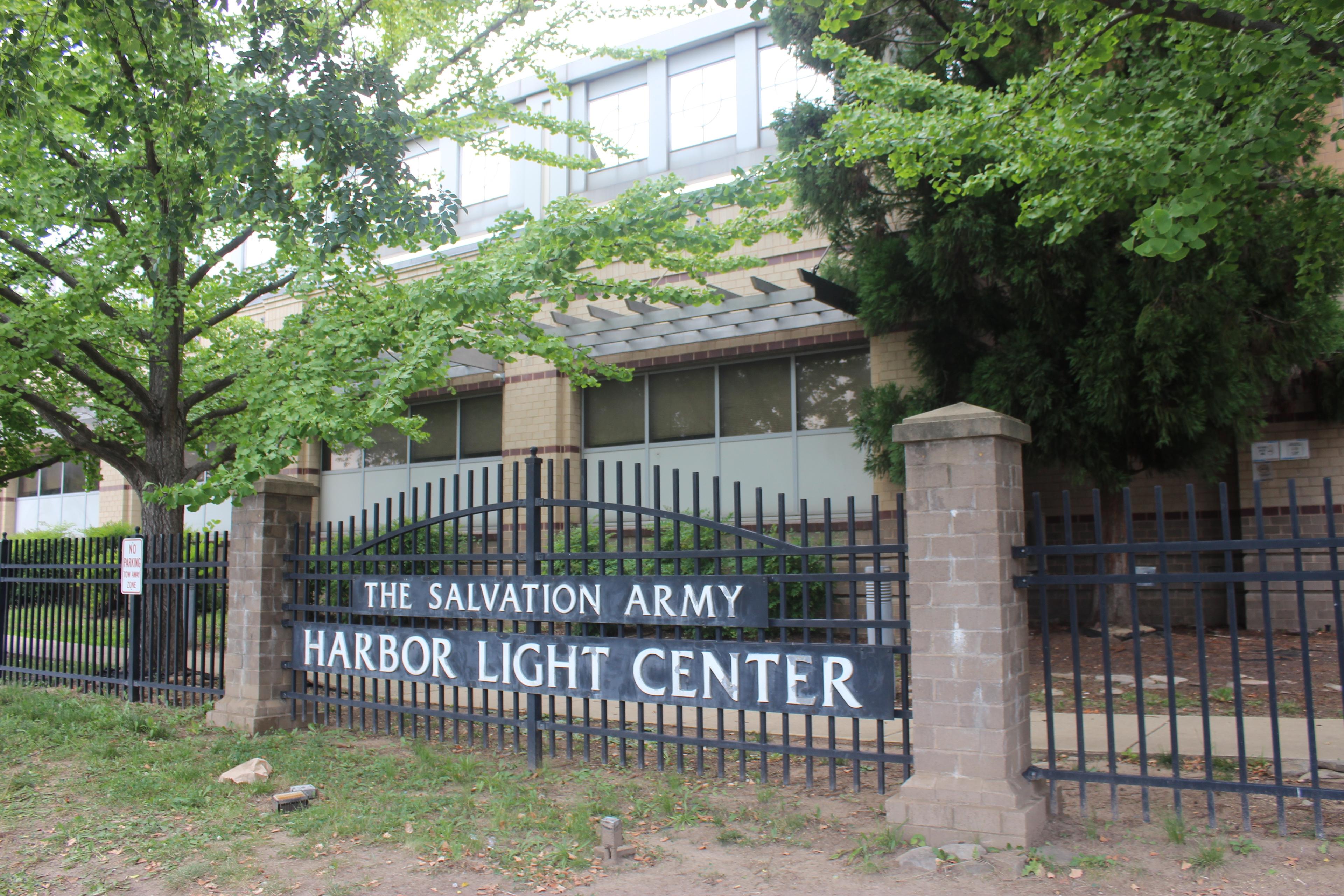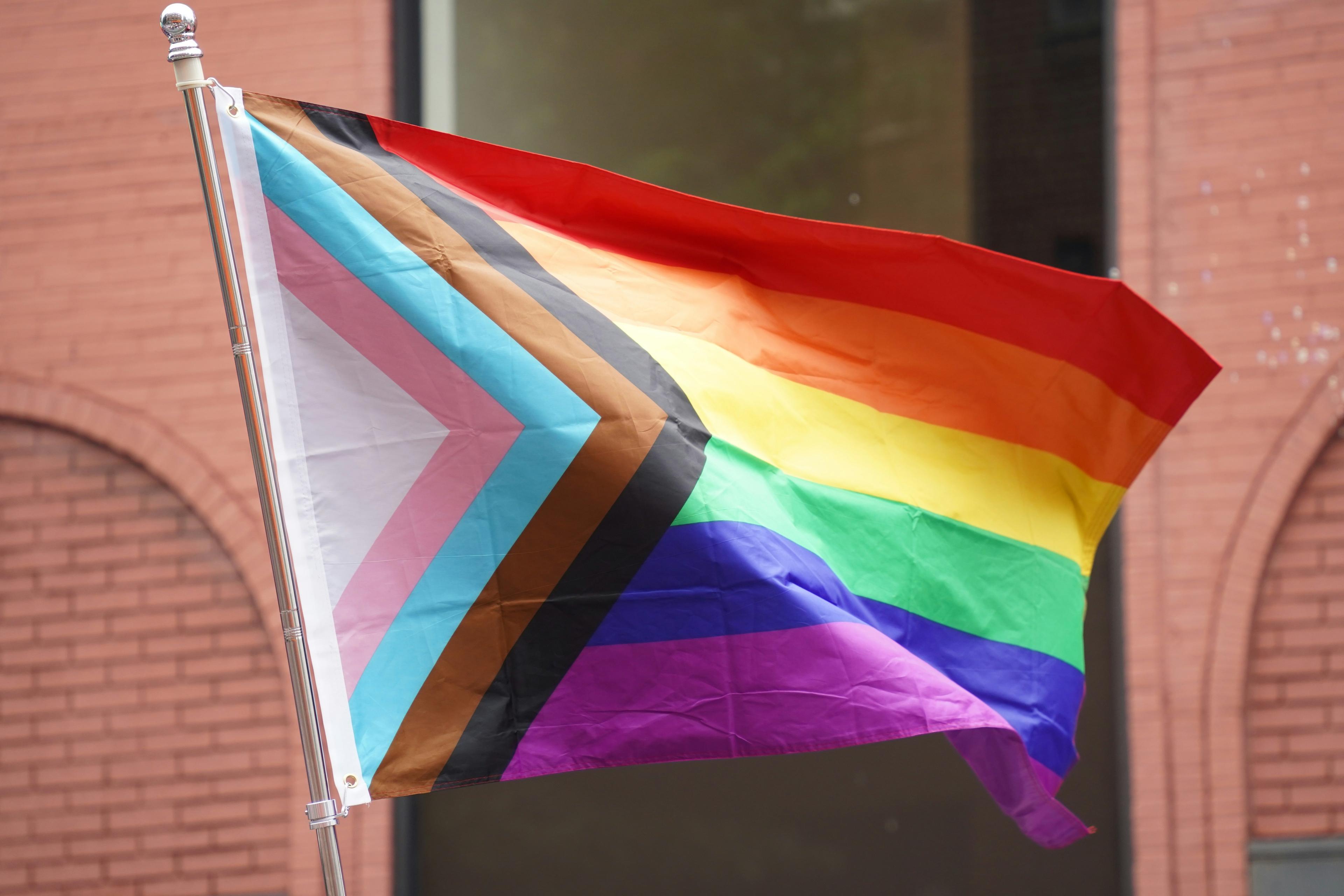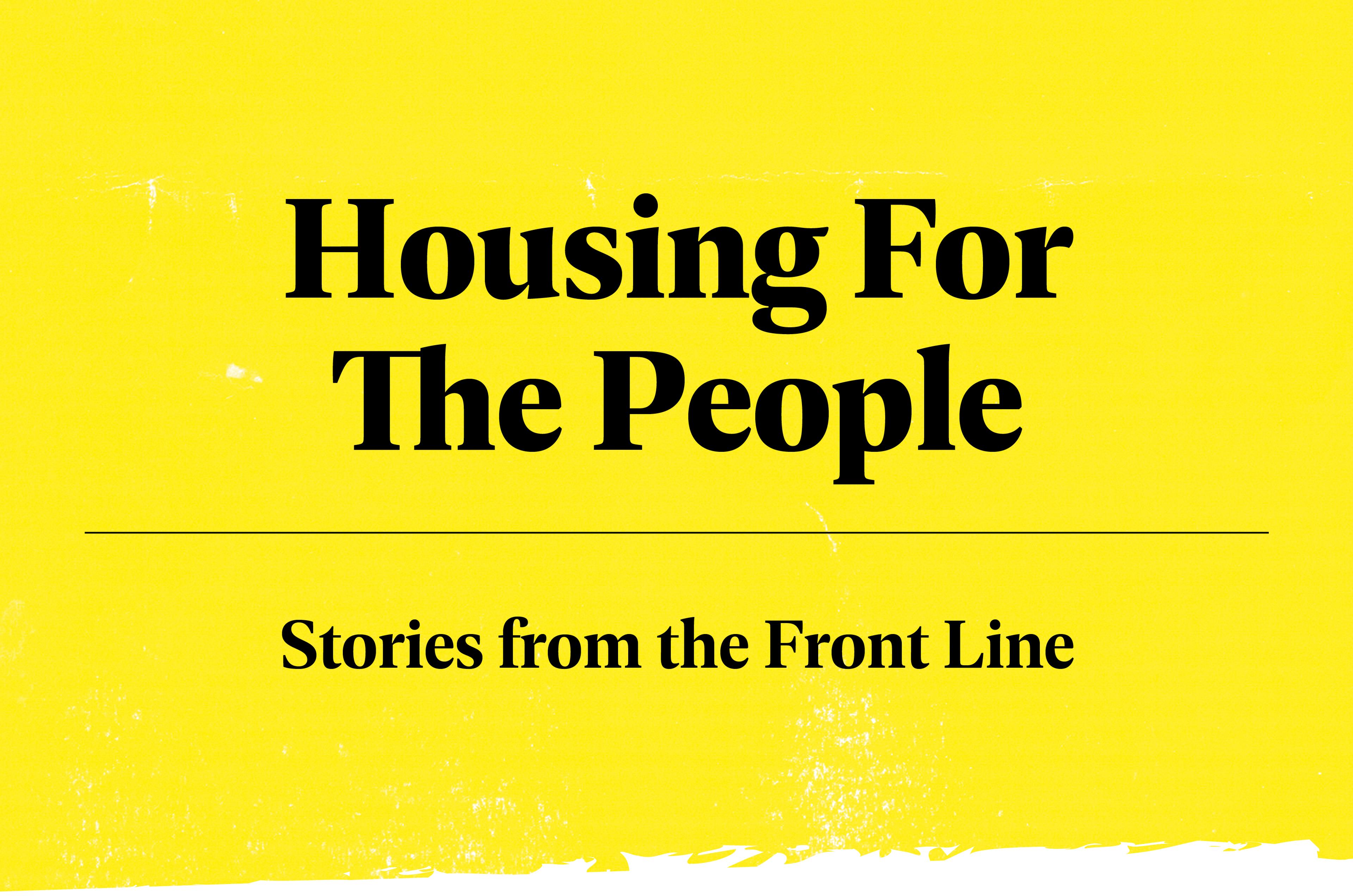Residents at DC’s last operating migrant shelter told to leave

Photos by Jelina Liu
By Sachini Adikari
- Lived experience
In early June, children living at DC’s Harbor Light Center migrant shelter could be seen playing in the facility’s parking lot, biking around in circles while their mothers sat on a curb sipping on juice boxes. By the end of the summer, these families, some of whom have lived at the shelter for months since arriving in the city, will have had to find somewhere else to go, as they are told they have to leave the District’s last city-funded migrant shelter.
DC began telling migrants that they had to leave the only operating migrant shelter earlier this summer, according to shelter residents, after Mayor Muriel Bowser’s fiscal year 2026 budget proposed defunding the Office of Migrant Services (OMS), a $39.8 million cut. With residents being told to leave OMS’s only operating shelter by the end of the summer, several months earlier than previously expected, migrants in the District are struggling to find stable housing. Harbor Light residents told Street Sense that they had no plan for housing after being told they’d soon have to leave the facility, and with no access to the city’s family shelter system, some families may become homeless or have to leave the city.
Erika, whom Street Sense is only identifying by her first name due to her immigration status, lived at the Harbor Light shelter for three months. She said that social workers told her in early June that there were no remaining resources in the city government to help migrants and that the shelter would soon shut down. “They said to go looking for a room, or a place to live, because soon after July, it could be closed,” she said.
The future of the shelter is unclear. According to a spokesperson from DC’s Department of Human Services (DHS), which oversees OMS, the shelter was still open as of 15 July, though the office expects all families to exit over the summer. The spokesperson did not confirm whether the shelter was closing or provide a closure date. DHS has recently been tight-lipped when it comes to OMS, providing blanket statements in response to basic questions.
But those on the ground say that they were told that the shelter was closing soon. Harbor Light residents told Street Sense in February they had been told they had until December 2025 to stay at the shelter, but in early June, days after Boswer released her proposed budget with cuts to OMS, 10 shelter residents said that they were told that they would have to move out before the end of July. When Street Sense reporters visited the shelter most recently, on 15 July, they did not see any families outside, though they were not allowed inside the shelter.
Abel Nuñez, executive director of The Central American Resource Center (CARECEN), which works with OMS to find housing for migrants living in the shelter, said that only one family was still living at Harbor Light as of 15 July, and that they would be transferred to the city’s homelessness services system. Another person working with residents said that all the families she knew had left Harbor Light.
“Harbor Light as respite/shelter is closed,” Nuñez wrote in an email on 15 July.
In recent days, lawmakers have suggested using Harbor Light to house families in DC’s homelessness services system as family shelters fill up, though it is not clear if that plan contributed to the decision to have migrants leave the shelter or whether those shelters will allow migrant families to move in.
The DC Council established OMS through the Migrant Services and Supports Temporary Amendment Act of 2022 in response to the hundreds of migrants bussed into the District from Texas and Arizona. Governors from these states moved migrants into sanctuary cities to condemn Democrats and former President Joe Biden’s administration for their border and immigration policies. As buses to the city slowed, the office also became the primary resource for any migrant who arrived in the District.
The law that established OMS also made new migrants ineligible for many of the city’s other services. DC’s homelessness service legislation defines those who are eligible to receive services as people who are living in DC “voluntarily and not for a temporary purpose.” But the 2022 law amended the definition of “District resident” to exclude people who entered the US after April 2022 and have ongoing immigration proceedings. Newly arrived migrants were thus not eligible for the city’s family shelter system and other resources that District residents experiencing homelessness can access, like transitional housing support.
“The reason why OMS was created is because DC government did not want these people accessing existing city resources, so they created this parallel system with much less support,” Mariel Vallano, a court organizer with Migrant Solidarity Mutual Aid, said.
In 2022, OMS opened three temporary migrant shelters — a Days Inn, Quality Inn, and Hampton Inn — at hotels located along New York Avenue in Northeast DC. The hotels were used to provide families with short-term housing, but many families lived in them for months due to the barriers to independent and more permanent living situations, including low wages, as well as the lack of access to resources that other District residents qualify for.
Jose, whom Street Sense is identifying only by his first name because of his immigration status, arrived in the District from Ecuador in June 2024 with his wife and three children. They stayed with friends for three months. In September 2024, the family moved into Harbor Light, where they’ve stayed until this summer. The family lived at the shelter longer than expected because Jose does not make a livable wage and cannot afford rent in the District. “I look for work, and I find a job some days, but not enough to pay the rent,” he said.
OMS opened Harbor Light Center as a short-term shelter in June 2023, shortly after the New York Avenue hotels reached full capacity with over 1,200 people from 370 families staying there. After the office scaled back its services by closing all three hotel shelters at the end of 2024, the former rehabilitation facility, operated by SAMU First Response, was the District’s sole migrant shelter. Vallano said that “quite a few” families who had previously lived at the New York Avenue hotel shelters for years ended up at Harbor Light.
Before moving to Harbor Light, Erika and her family lived at the Quality Inn OMS shelter from April 2024 until its closure on 11 October 2024. Then, the family moved to Oxon Hill, Maryland, where they stayed until April 2025. The family moved back to the District and into the OMS shelter system in April due to financial concerns, and so that Erika’s husband, Alfredo, could work while Erika stayed at home with their children.
Conditions at the Quality Inn were much better than those at Harbor Light, Erika said, as families had private rooms, televisions, and beds. She said that at Harbor Light, multiple families shared a room with one shared bathroom, and each person got a military cot to sleep on.
While the city said that they worked with migrants leaving the shelter to find housing, and adapted exit timelines to the needs of each family, Vallano said that she worried that many former residents would end up sleeping on the street or in cars. Some families might get lucky and sleep in the living rooms of friends, she predicted, while others may try their luck in another state, like one family she knew who drove to another state to find shelter.
“That’s what Bowser wants them to do. She effectively wants them all to leave,” Vallano said. “From the very beginning, her narrative was that they’re not going to be staying as long-term DC residents, and that’s what she tried to convince everyone of, so we’ve seen all of her policies up until now being targeted at just forcing people out of DC.”
In May, Bowser quietly proposed walking back the District’s sanctuary city law in her fiscal year 2026 budget proposal with a provision that proposed repealing the six-year-old DC law that prohibits city agencies from cooperating with federal immigration enforcement. The DC Council removed that provision from budget legislation late last month.
A DHS spokesperson wrote in an email to Street Sense that OMS has helped “hundreds of families” transition out of DHS support and into independent housing, and that the office was no longer necessary since all the families were expected to exit from its services over the summer. DHS did not comment on what specifically the city had done to find housing for people leaving OMS services and did not provide Street Sense with data on how many families remained at the shelter at any time in the last year.
In July 2024, 345 people across 97 families were staying in OMS hotels, according to a DHS statement at the time. According to OMS resettlement data obtained by Street Sense, 51 families resettled in September and October 2024, though the data did not include the number of families that remained in OMS shelters.
“With all of the families expected to exit the program over the summer, there will no longer be a need to continue to operate OMS in Fiscal Year 2026,” a DHS spokesperson wrote in an email to Street Sense.
Making plans to have to leave the shelter this summer, Erika said in mid-June that she wanted to save money to rent a space in the area. Alfredo, the family’s sole source of income, works as a full-time DoorDash courier. But her youngest child has a hearing impairment, which Erika said requires her to stay at home, preventing her from seeking work.
Alfredo, whom Street Sense is only identifying by his first name due to his immigration status, said that shelter staff had not yet provided the couple with guidance for somewhere to move and that the couple did not have a solid plan for housing. “It’s a difficult situation, but we are figuring it out,” he said.
Katherin Ochoa, a single mother who moved to the District from Venezuela with her four children in December 2024, said that she began hearing rumors from other residents in May about Harbor Light shutting down. Shelter staff had not yet made a public announcement to shelter residents as of 24 June, Ochoa said, and instead told individual families that the facility would shut down in mid-July and that residents would soon have to move out.
“I found out from the people who are couples who are here – I found out that they are going to close it, they explained it to me,” Ochoa said. “The single mothers did not get enough information about when they wanted us to leave.”
Ochoa works as a housekeeper at Quality Inn on New York Avenue, which previously served as a temporary shelter for migrants. When she spoke to Street Sense in late June, she said that she did not have a housing plan, and that she hadn’t looked for alternative housing in the District because she knew she couldn’t afford it, but she hoped to stay in the city so that she could keep her job at the Quality Inn.
“It is a surprise because we didn’t expect that they were going to close,” Ochoa said. “It was a surprise, and they didn’t give us time to digest it. They just said, ‘We’re going to close,’ and that’s it.”
When the New York Avenue hotel shelters were preparing to shut down last year, residents were never notified in an official capacity that they had to vacate the shelter, according to Vallano. She said that residents were instead alerted by hotel staff, such as cleaners, that they had to leave the facility.
“Sometimes they’ll use the Catholic Charities’ caseworkers to do that job for them, but most of the time it’s just word of mouth; there’s never paperwork, there’s never official statements,” Vallano said.
This lack of guidance continued at Harbor Light, Vallano said, as shelter staff announced that families had to leave on 24 June, but had not provided Harbor Light residents with any direction on where to go by the end of June. Residents are also losing access to food assistance, as they received meals at the shelter.
Vallano said that OMS did not do enough to ensure that migrant families who stay in the city create independent lives and find stable housing. With the defunding of the office looming, Vallano is unsure what will happen to families who would normally be routed to OMS, since they currently do not qualify for homelessness services through DHS.
“What happens when an immigrant family shows up now and there’s no more Harbor Light to send them to? Do they just sleep on the street? Or are they going to have to accept them to provide some type of service?” Vallano asked. “We’re not sure.”
Looking forward, Nuñez, from CARACEN, said that the city should create an integrated, multi-lingual, and multi-cultural system where every DC resident experiencing homelessness has access to government programs and assistance as opposed to a stand-alone migrant system like OMS. He expects shelter residents who still need help will be referred to the general shelter system.
“I understand why [OMS] needed to exist when we had a huge influx in such a short amount of time, but at this moment, we need to reintegrate all of those efforts into the existing structure of government and not separate them at all,” Nuñez said.
He added that Bowser may have defunded OMS because the number of migrants coming into DC is no longer “overwhelming”. “OMS, even at its best, was only meant to be temporary,” he said. “It’s never meant to be long-term housing for any of the immigrants.”
There’s potential for a future integration of migrants in the city’s homelessness system under a provision in Bowser’s 2026 budget proposal, which allows the District to temporarily house families in communal, less private spaces, known as “congregate” shelters. In a statement to WAMU, Rachel Pierre, the interim head of DHS, said that the District also plans to send those who cannot prove District residency to the same congregate shelters, opening up for the potential integration of migrant families in the District’s housing system.
The District is likely to run out of space in its existing shelters in the next few months as families exit other programs experiencing budget constraints, according to Pierre in WAMU, who said that this makes the shift to congregate shelters necessary. The DC Council changed the provision on its first vote on the budget to allow up to two families to be housed in private rooms, similar to the current setup at Harbor Light, which lawmakers have cited as a potential option for expanding family shelter.
Weeks before leaving Harbor Light, former residents like Erika and Jose were still looking for a place to go. At the time of the interview, Jose said that after the shelter’s closure, he and his family plan to move to Oxon Hill, Maryland, because housing is cheaper and the family has friends who live in the area.
He added that he understands that the shelter was never meant to be a permanent solution, but that because he does not have a steady job and because there is a lack of guidance from OMS, he has struggled to find a better alternative. “More than anything, here, there is no help,” he said.

